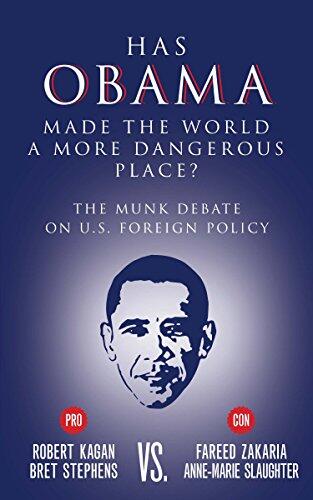
Has Obama Made the World a More Dangerous Place?: The Munk Debate on America Foreign Policy
まだ評価がありません
形式
ペーパーバック
ページ数
128
言語
英語
公開されました
Feb 14, 2015
出版社
House of Anansi Press
ISBN-10
1770899960
ISBN-13
9781770899964
説明
In a heated intellectual showdown, four prominent figures come together to tackle a pressing question regarding America’s global role during Barack Obama’s presidency. The debate, held in Toronto, features the sharp insights of political experts Anne-Marie Slaughter, Fareed Zakaria, Bret Stephens, and Robert Kagan. Each participant brings their unique perspective on how Obama’s foreign policy decisions have shaped international relations and whether his leadership has made the world more perilous or brought about stability.
The discussion is marked by passionate arguments, challenging the audience to consider the complexities of global politics. Skeptics of the Obama administration point to crises and confrontations that emerged during his tenure, suggesting that a retreat from traditional hard power has emboldened adversaries. Conversely, others highlight diplomatic breakthroughs and a more nuanced approach to international cooperation as evidence of a strategic pivot towards constructive engagement.
As the debate unfolds, it immerses viewers in a rich analysis of critical events, including the rise of ISIS, relations with Russia, and the ongoing challenges in the Middle East. The dialogue encourages a deep reflection on the implications of foreign policy decisions that resonate well beyond American borders.
Ultimately, this spirited debate invites readers to question the effectiveness of Obama’s strategies while contemplating the broader impact of U.S. actions in a rapidly evolving global landscape. It serves as both a historical snapshot and an enduring exploration of America’s role in shaping a safer world.
The discussion is marked by passionate arguments, challenging the audience to consider the complexities of global politics. Skeptics of the Obama administration point to crises and confrontations that emerged during his tenure, suggesting that a retreat from traditional hard power has emboldened adversaries. Conversely, others highlight diplomatic breakthroughs and a more nuanced approach to international cooperation as evidence of a strategic pivot towards constructive engagement.
As the debate unfolds, it immerses viewers in a rich analysis of critical events, including the rise of ISIS, relations with Russia, and the ongoing challenges in the Middle East. The dialogue encourages a deep reflection on the implications of foreign policy decisions that resonate well beyond American borders.
Ultimately, this spirited debate invites readers to question the effectiveness of Obama’s strategies while contemplating the broader impact of U.S. actions in a rapidly evolving global landscape. It serves as both a historical snapshot and an enduring exploration of America’s role in shaping a safer world.